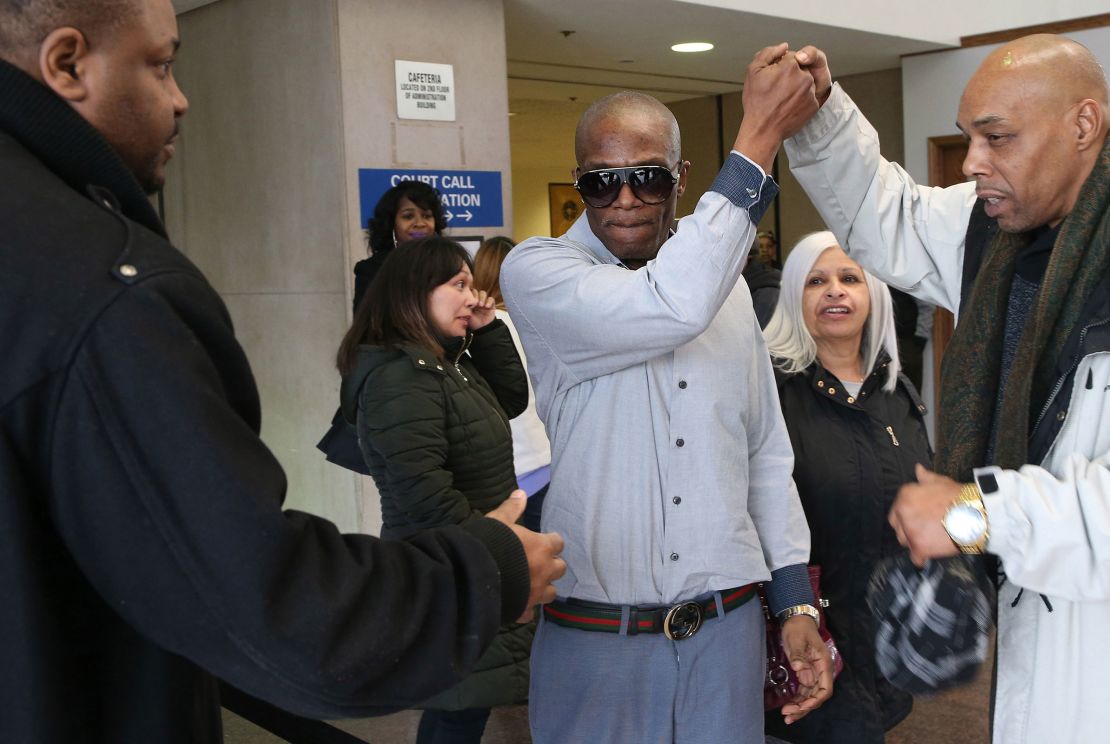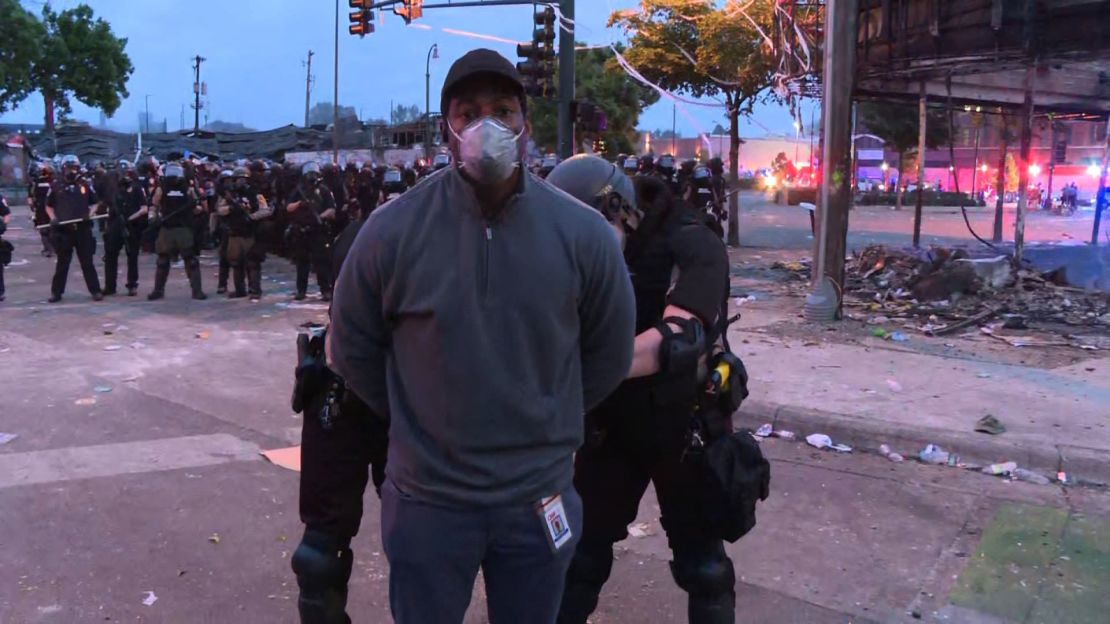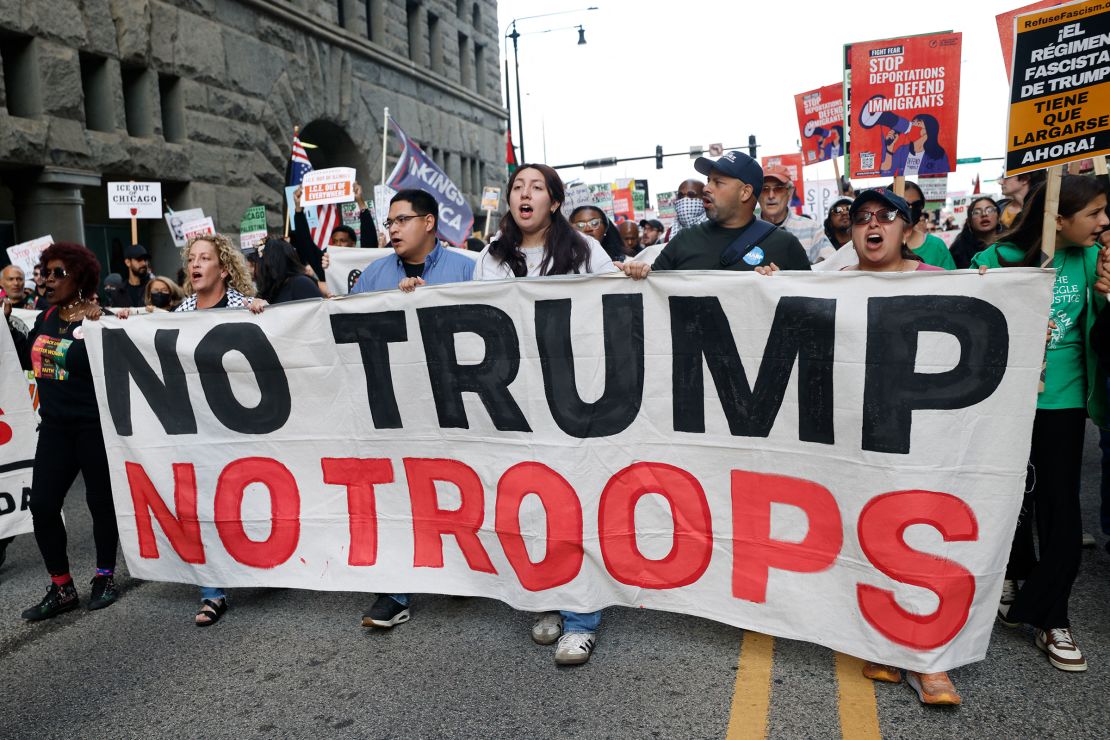A version of this story appeared in CNN’s What Matters newsletter. To get it in your inbox, sign up for free here.
There’s a fascinating new podcast series from CNN’s Omar Jimenez about systemic torture carried out by the Chicago police department over many years starting in the 1980s.
There were startling revelations, cops put in jail and millions in damages ultimately paid by the city.
Jimenez first learned about the stories when he was in college. Years later, after his own experiences covering stories like the murder of George Floyd in Minneapolis, he and a team have produced an engaging look at American justice.
The podcast focuses on a few different characters, including James Gibson, who was wrongly convicted and tortured, Andrew Wilson, whose guilt for killing two police officers has not been questioned even as people learned of his torture, and Jon Burge, a police commander who oversaw torture.
The podcast also comes at a time when President Donald Trump is threatening to send the National Guard into Chicago, ostensibly to clean up the city, no matter what local officials want.
I talked to Jimenez about the project and justice in Chicago. Our conversation, edited for length, is below.
A project years in the making
WOLF: This is not your typical CNN project and you came to it in an atypical way. It sounds like it’s been years in the making.
JIMENEZ: When I was a student at Northwestern, I was interning and working with the Chicago Innocence Project, where they reinvestigate potential wrongful conditions. I came across this guy who worked with that group who told me about being tortured by this police commander and his unit in Chicago. He had spent decades in prison and was eventually exonerated.
I couldn’t believe what he was telling me. I remember at the time going and looking at this police unit, seeing the actual scale of what this era of policing in Chicago had created. This is Jon Burge and the detectives under him, known as the “midnight crew.” They literally tortured over 100 people, sometimes into false confessions, over the course of decades. I remember thinking, “Why don’t more people know about this?”
Years go by. I had tried to pitch various versions of this in various forms. Nothing really came together in the right way. But then this year, 2025, I got connected with someone who was trying to get a civil settlement from the city of Chicago for being wrongfully arrested and sent to prison back in 1989 and 1990. Here we are, over 30 years later, and this guy’s still trying to get justice from the city.
Why use the word torture?
WOLF: The word torture is used repeatedly throughout the podcast. It’s a word that has great impact. How did you decide to use the word torture as opposed to police abuse? What is the line?
JIMENEZ: The line is truly impact. When you don’t use the word torture, you run the risk of sanitizing the brutality of what was done here. It was a very conscious decision. There’s even a moment in one of the episodes where we take a second to talk about what the word torture means, and even how that word has been normalized in what we watch on TV and in movies — you torture the bad guy to get the information you need to save the world.
That is like a very classic trope that you see play out in movies, but when it happens in real life, the implications and the impact that last are something that isn’t quite as known or seen.
When you hear the word torture, I think people have the tendency to say, “Well, that doesn’t happen here in the United States.”
But it happened. It happened in the US. It happened in Chicago. It happened over an extended period of time.
As we show in the podcast, there were many opportunities for people to step in and stop this, and it just didn’t happen.
Why tell this story?
WOLF: What are you hoping to accomplish with this story?
JIMENEZ: The question we wanted people to wrestle with is, “What is justice?” Depending on what side of the conflict you’re on, justice was convicting our main person, James Gibson, back in 1990 because you saw the double murder, so to speak. And we spoke to the son of a person that was killed in that double murder, who said, yeah, that was justice for him. That closed the book in his file.
When Gibson got out and won almost $15 million — is that justice? What’s the dollar amount on losing almost 30 years?

The police commander, Jon Burge, he eventually is arrested, serves a few years in prison and dies and never really has to answer legally for the torture claims that were levied against him for decades, but he did go through the justice system. Is that justice? People looking for a satisfying ending will find that there’s no perfect ending here. And I wanted to people to think about how they view justice in their own lives, as they examine the world around them.
What’s the situation now?
WOLF: Is this a historical story in that Chicago has fixed this problem? Or are these kinds of allegations still happening?
JIMENEZ: These kinds of allegations are still happening. The person we featured in the story, James Gibson, we were with him as he finally got his $14.75 million settlement this year.
What’s not in the podcast, because it was after we had done the bulk of our interviews, is another man whose name is Jackie Wilson (Andrew’s brother). He got a $17 million settlement tied to the same era and what happened back in 1982. And then in present-day Chicago, there is a $90 million settlement that is set to move forward, tied to a single former Chicago police sergeant. This was someone that was accused of essentially shaking down residents in a Chicago neighborhood in the early 2000s.
How was this torture system exposed?
WOLF: There’s a peel-back-the-onion element to the story you present — there are these dogged reporters, there are anonymous letters. In other words, people didn’t know this was happening in real time. Was there one thing that ultimately brought this scandal to light?
JIMENEZ: The unlikely person that helped bring this to light was Andrew Wilson, someone who shot and killed two police officers and whose guilt was never questioned. He killed two police officers. He was tortured extensively when he was arrested for that crime. That torture was documented in a way that really was unmistakable. People who saw the photos of what happened said something happened here, something beyond the pale. Bit by bit, reporters started paying attention. This person then launched a civil suit. Even though he couldn’t get out of prison because of the criminal conviction, he still could potentially get money from the city for how he was treated. That kept things in the news. And then because of that exposure, the people that were covering that case and defending Wilson in court started getting tips about other people.
It wasn’t necessarily one thing. I think this story really encapsulates the drip, drip, drip of one thing happened here which led to this, which led to that. Even after Burge was fired in the early ‘90s, there were still more names being uncovered through the early 2000s and people were slowly starting to figure out how deep this actually ran.
What happens when there are no witnesses
WOLF: There’s an important moment in here where you describe being arrested live on TV in 2020 while reporting from a protest, and how even then, authorities were saying they needed to verify who you were and that it was a difficult process, even though it was pretty obvious you were reporting for CNN. You contrast that with what it’s like for somebody to be arrested when nobody’s watching them live on TV. How did you come to include that contrast? It’s really striking.

JIMENEZ: One of the themes through all of this is that things didn’t really change for the folks in this story until eyes, more eyes, started getting on what they were seeing. That idea of witnesses being your greatest advocate, and being this protector, in a sense, against someone who might try to plant a narrative on you. That was a big part of how I thought and reflected on what happened to me personally. As we were building this podcast we were dealing with some of the same dynamics, and I started thinking it’s important for me to show a little bit more connection to this story, but also show that the elements of what we’re talking about here, although they literally happened decades ago, are still prevalent in our modern times.
There wouldn’t have been cameras to the extent that we have now, obviously, but if there was someone looking out for James Gibson, if he came from a different neighborhood, and there was more attention maybe put on what he was saying that he didn’t do this, and maybe his outcome would have been different. But he didn’t have that. It connected to me. He didn’t have live TV. Even if cameras weren’t there, I felt pretty confident that CNN would come to my defense, and there just wasn’t someone of that caliber that was coming to James Gibson’s defense.
How does Chicago view Trump and the National Guard?

WOLF: The podcast comes out at a time when Chicago policing is in the news because President Trump is threatening to send in the National Guard, something the local officials don’t want. Part of his argument is that the people of Chicago deserve to have more safety. Does Trump’s claim have any resonance there, given the relationship between the police and the local community?
JIMENEZ: I think generally people in Chicago are wary of government overreach. The governor did not want the Guard sent in and it may not be legal without the governor’s approval. And so just that fight to begin with made at least the folks that I spoke to skeptical that this was happening for authentic reasons, as opposed to political reasons. So you can start there.
As far as wanting resources to help with the real issue of violence that they continue to deal with, the majority of people wanted more resources, but they didn’t want the National Guard, and that’s what I thought was so interesting.
I went to the neighborhood that sees more shootings per capita than any other neighborhood in the city, and I spoke to a woman who’s lost a close family member, who told me she can’t have her grandkids and nieces sit at the kitchen table because she worries a bullet might come through the window. And she said she doesn’t want the National Guard, because what are they going to do? She wanted the resources that would have gone toward sending the National Guard to help fund community centers to help give the kids in her neighborhood more pathways.
And then when I sat down with the police superintendent in Chicago, he didn’t comment to me about the National Guard specifically, but he did acknowledge the longstanding challenge of bridging trust between the communities they serve and the police department, but he says they’ve been making progress on them, and he did also shout out the federal partnerships that they have, that they use on a daily basis – that’s the ATF, that’s the crime gun intelligence centers, but not the National Guard.
If I had to guess, this is me guessing here, he would probably take more resources on and some of those federal partnerships that help them process crimes quicker.
There was one person that one of our teams spoke to that said that she wanted the National Guard to be here, and that instinct is very understandable when people are seeing videos of smash and grabs of, you know, people getting shot at places in the city, people getting robbed. But when I went to some of the neighborhoods, again, they were most affected by daily gun violence and daily threats of violence, I just didn’t see the overwhelming push for the National Guard in a place like Chicago.



